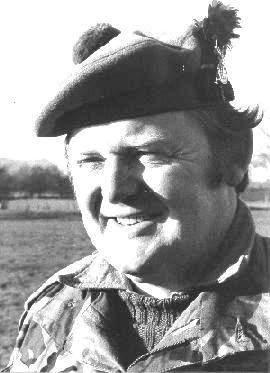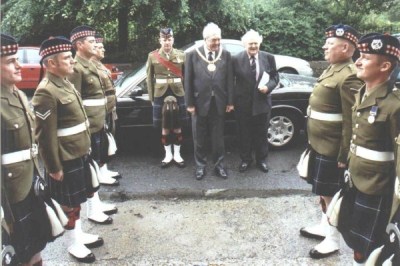Major D.S. Evans TD Tribute
Major David Stanley Evans TD 1937-2002
Major David Stanley Evans TD
1937 - 2002

David Evans was the initiator of the Liverpool Scottish Regimental Museum Trust and its only Secretary since its foundation in 1979 until his death. He was not the founder of the Museum or its curator but he has been responsible for much that has been achieved in the last 25 years. He died unexpectedly on 13th August 2002 and we offer our sympathy to his wife, Jean, and their daughters, Sian and Alexandra, together with his wider family. He was cremated privately immediately prior to the Service of Thanksgiving, attended by over 250 people, on Monday 19th August 2002 at All Saints' Church, Forefield Lane, Great Crosby, Liverpool at which the Rev. John Patterson officiated and the Rev. Harry Ross gave the address. The lament 'Flowers of the Forest' was played by Piper Arthur Gallagher, the Liverpool Scottish Regimental Association piper. The tribute, below, was given by a member of the Museum Trustees.
During this sad week, I have been asking people 'What qualities made David Evans?'. The words that I have had in reply have been 'professional', 'high standards', 'absolute quality', 'dedication', 'family spirit', 'went that extra distance', 'friendship', 'loyalty', 'service', 'principle', 'ebullience' but that is not all that needs to be said. So often we know a man only in as much as he connects with our own life. There are the common threads but I want to try and join these pieces of the fabric together.
David Stanley Evans landed on the 9th December 1937, living with his parents and his two brothers in Allerton. Springwood Junior School was followed, in 1948, by a scholarship at the renowned Liverpool Institute and thence to the choir of the great Anglican Cathedral, a fact not always immediately apparent on church parade but obvious in his love of the hymns we sing today. Here he must have developed his love of the city and its public life.
A long-remembered tea with the Bishop at the Adelphi perhaps set his lifetime benchmark for style and hospitality. The Cathedral, then in the charge of Dean Dwelly (a man with the highest standards of ceremonial and liturgy), made its mark. Always David was conscious of dignity and respect for the meaning and significance that those attributes brought to any event. Dean Dwelly might have been pleased.
As a child, a keen footballer, he played a match on the Anfield turf of which he was very proud. Later in life he was a season ticket holder with interests in cricket and golf and a member of the Northern Club.
Leaving school, David went to Tate and Lyle, then a power in the city with a huge sugar refinery. Following National Service in the Royal Signals, he returned, becoming the 'Small Packets Manager'. There is an irony here in that David was never a worker on a small canvas. These years involved the command of a battalion of ladies of widely varying personality and admiring heads turned as David drove his open top motor into work; at least that is what he told others. Here he must have honed his skill in relating to the whole spectrum of human personality.
In 1966, David met Jean at the salubriously named Gaslight Club, the 'haunt of the young professionals', and they were married in 1967. This marriage has been blessed by the appearance of Sian and then Alexandra.
Just here I need to divert from David's career. David, however else we might know him, has always been first and foremost a family man. His love for his wife and daughters has been apparent to us all and he would be the first to acknowledge that much of what he has done has been achieved with the reciprocal love and support of Jean and the girls through good times and bad. He and Jean have been a team in everything and their home always a haven of hospitality and warmth.
David moved on to Tate and Lyle's Silver Roadways transport group. Here, the skills from the Territorial Army (400 men moved through miles of German forest at midnight with five lorries, three drivers, two sets of contradictory orders, one map and no compass) found commercial application.
Subsequently, David worked for Merseyside Fuel Distributors in Waterloo and then for Blake's, the Ford dealers, as service manager. To all his working life, David has brought his painstaking attention to detail, enthusiasm, cheerfulness and his ability to treat everybody as important.
Interleaved with all this is the Army, the TA in particular. The TA and his regiments captured his unswerving loyalty and devotion. Serving in them, he had a duty towards them. Loyalty, devotion, duty are not fashionable words but show in his unwavering standards.
In the late fifties he joined 287 Medium Regiment, Royal Artillery, where he was commissioned. Equipped with 5.5 inch medium guns and then the 25 pounder, they and the whole TA were disbanded in 1967. David did not then go on into the new TAVR but you may have noted that, following the 1967 reorganisation of his personal life, there was a new commanding officer in post.
By 1973 he had obviously negotiated a parole as the junior officers of V (The Liverpool Scottish) Company were informed that they were to be joined by two officers of such seniority and age (particularly age) that they would be arriving as Captains. David, to his slight surprise, had become an infantryman.
David was ubiquitous (living to the Gunners' motto of 'Ubique' meaning 'everywhere' or 'all over the flaming place', however you choose to think of it). Commanding the HQ element, signallers, drivers, cooks and the rest, they loved him. Involved with the Museum, already under the hand of its curator, audit boards, organising dinners and above all setting standards. In the Angels' Mess above we may be sure that henceforth dinner nights will be better ordered and even now there may be a celestial toast to the Duke of Lancaster. Willing to learn, we moved his radio procedure (he may have called it the wireless) on from his carrier pigeon days. One of our triumphs was to ensure that, despite the break in his service, David qualified for the Territorial Decoration of which he was so proud.
His inveterate collecting (medals, pictures, books, ephemera and whatever caught his eye) was fascinating and his knowledge was wide. David has patrolled the auction houses and second-hand bookshops of Liverpool for forty years or more and is known, trusted and respected by them all. He had an eye for a bargain but above all uncovered the quirky, the original and the aesthetic.
Later in the TA his boundless enthusiasm and kilt transferred to Liverpool University OTC where he gained a whole new network of friends, young and old, imparting the same high standards as ever to young undergraduates.
As Chairman of the Liverpool Scottish Officers' Association he maintained the network of officers, pre-war to today, and retained them within the Regimental fold. Many are here today from across the country. The Liverpool Scottish is a family and it is not just David Evans, of course, but his contribution to Regimental life has been incalculable. In some projects he led, in others not, but always his contribution was significant. Deep involvement with the centenary ball, the Officers' centenary dinner, trips to Belgium, his entirely personal concept of Scottish Wood at Altcar Ranges and its execution, placing the Liverpool Scottish Memorial Stone on its Belgian battlefield were almost routine.
His principal work has been the Liverpool Scottish Museum. David did not found it and he was never the curator but, as Secretary, he drove forward from 1978 to form a proper charitable trust, advancing standards of acquisition, recording and organisation. The collection has grown and prospered with a huge network of friends and contacts. From the closure of Forbes House in 1999, within sight of full registration status, he has heroically preserved the integrity of the collection. Meanwhile, working in collaboration with others on a new regimental history, it was with pride, a year and half ago, that he saw his name amongst theirs on the front of the fine volume, 'Bravest of Hearts'.
More than a collection of uniforms and medals, the museum has a large photographic and documentary archive, recording the lives and deaths of our soldiers. This heritage was not to be lost; this trust was not to be broken. David cajoled, encouraged, enlisted, blackmailed and worked miracles. A team effort but David was indefatigable and the museum is already busier than ever. The tragedy is that his death occurs on the last lap of this medium term project to preserve the Museum. At least he saw (and tirelessly organised) the re-dedication of the War Memorials in June.
Apart from involvement with the Army Benevolent Fund and the North West Royal Artillery Officers' Association, where he was happily involved in the St Barbara's dinner, he has made very significant contributions in three fields.
David was highly valued member of the King's Regiment Museum Advisory Committee playing a significant part in establishing the new King's Gallery
The National Employers' Liaison Committee (NELC) exists to persuade employers both that they should support the reservists they employ and recognise the skills that transfer to work from service in the reserve forces. David believed in this passionately and has done outstanding work for NELC.
Together with the Merseyside coordinator of the National Inventory of War Memorials, he has visited up to 1500 sites in Merseyside to record the details of memorials in every conceivable location.
To get a man's life and personality, especially a man such as this, into ten minutes is no easy task. The threads are loyalty, devotion to the cause and the painstaking determination to see the job done well. 'Festina lente' (to hasten slowly) might have been David's motto but there are times without count when things have turned out infinitely for the better through David's perseverance, imagination and initiative and above all, his refusal to accept second-best. He was a man with the courage of his convictions. Physical limitations were brushed aside; they were not a factor. He has touched many lives; somebody told me that 'had a word for everybody' and another that 'he all ways had time for every jock'. Following David was like following a general on an inspection. Once he had checked the Lord-Lieutenant over he would happily move on to quizzing to the waiters, signallers, drivers, whoever.
Our huge loss cannot match that of his family but serves to sharpen the deep sympathy that we offer them today. Whatever we feel of the gap in our lives, our sympathy seems a small thing to offer Jean, Sian and Alexandra and his wider family in the wake of their immeasurable loss.
Who is David Evans?
David Evans, husband, father, friend, officer and a gentleman.
ILR

Major Evans may be seen here on the right of the Lord Mayor.
Previous page: WW2 Roll of Honour
Next page: H.S. Anderson